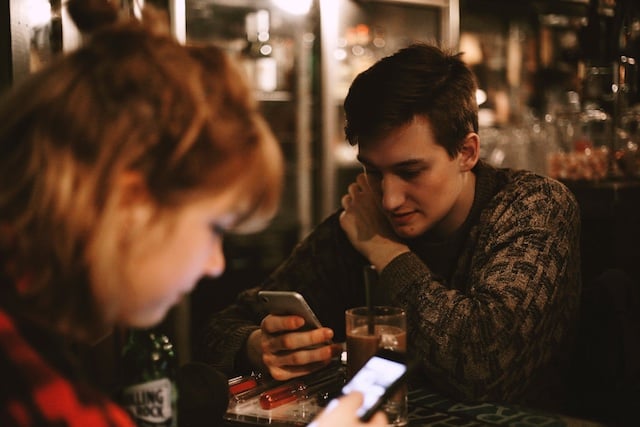Facebook scares the sh*t out of me in multiple colours.
Sometimes I want to run away from it screaming.
Still, I am a Facebook user, I’ll admit.
Why? Why do I stay in this toxic relationship that makes me feel violated and powerless so often?
Why don’t I quit?
Because it’s taken all my friends hostage. Facebook told us that through its platform we can all stay connected in a fast and easy way. And we all bought into it. We convinced each other to join. We stopped using email as a way to socially connect. Now there’s no way back. We’re hooked, two billion of us—and counting.
“This is wonderful,” I hear some people say, “What’s she bitching about?” Isn’t it great that we are now connected around the globe?
But how connected are we really? Let’s have a closer look at the workings of “connecting” on Facebook.
In Part 1 of this series, we learned how Facebook manipulates our News Feed—choosing what posts we get to see from which friends and single-handedly deciding when a friend stops to be News Feed worthy for us.
Facebook makes and breaks our friendships.
Everybody posts about their milestone events (usually once) and somehow we believe that everyone will see it. Now I am aware that this is a false belief, thanks to Facebook’s algorithm, and thanks to the fact that I’m not glued to my screen 24/7 (thank God).
Often I’ll see wedding photos coming by when I didn’t even know my friend had gotten herself a fiancé, I see babies but missed the big bellies, and find people living in new places without ever hearing about the new job/house/partner that made them move there.
Facebook does not really connect us at all.
Most of us scroll mindlessly through our News Feed, passively taking in our friends’ posts, hitting the like button, and maybe writing a few words in a comment. But when was the last time we spoke on the phone with them for half an hour like we used to—actually asking questions and listening to the answers?
Facebook makes us passive consumers of a cut-and-paste social scrapbook that covers only a small part of reality. Two billion people use this platform thinking that it truly connects us, while we are mostly just watching everything from a distance through a filter we aren’t even aware of. It’s an inflated sense of connectivity, and we’re all buying it.
Since we think we are all connected (believing that Facebook shows us everything), we assume that everybody else sees what we see on our News Feed. This is anything but true. Each News Feed is highly individualized, as we learned in Part 1.
Often I hear someone say, “Did you hear about this? It’s all over Facebook.” Sometimes it is for me too, but often it isn’t. It’s all over their News Feed, because the algorithm fed them more of what they had liked before.
Our News Feed somehow makes us think that the whole world is talking about yoga, or wedding dresses, or pit bulls biting children, or flower baskets, or hate and violence. We clicked on a post about meditation twice? The whole world all of a sudden seems full of meditators, retreats, books, and teachers. “Wow,” you think, “I never knew that everybody likes meditation!” Trust me—they don’t.
Once the Facebook algorithm gets a grip on us—thanks to our clicking behaviour—they swamp us with more of the same, narrowing our horizon and closing in our network instead of making it bigger. Our worlds can get scarily small and distinctly disconnected when we let Facebook have its way and do what it wants—which is sell us to advertisers.
On Facebook, we are all living in our individual bubbles of warped reality, manipulated by algorithms. I stay in my bubble; you stay in yours. We float by each other, and that’s about it.
Facebook doesn’t truly connect us, it disconnects us in many ways if we are not aware of how the algorithm compartmentalizes us into our own little News Feed prisons. It’s slowly isolating us more and more.
It disengages us and it disempowers us.
Apart from the information bubble Facebook creates for each of us, it also creates a digital bubble into which we retreat more and more. The amount of time spent scrolling mindlessly through our News Feed is time taken away from being with friends, talking to them, seeing them, hearing them, and feeling their presence.
If you are freaking out by now but still don’t want to quit Facebook, there are a few things you can do to connect more actively with your friends:
1. We can set our News Feed preferences to choose which friends and pages show up first.
2. Instead of just scrolling through our News Feed, we can go to people’s timelines and browse their posts and photos to get the full story instead of just the most popular snippets the algorithm feeds us.
3. We can post something on a friend’s timeline or send a private message with a personal photo or link to something that made us think of them.
4. Instead of just mindlessly scrolling through the algorithm’s preferred news, we can go to the pages of several news sources and learn what’s going on in the real world (instead of in Facebook’s algorithm’s world). I sometimes look up which pages a friend has liked to discover some new interesting topics and sources.
5. We can shut off our screens and phones and surprise a friend with a visit, pulling them out of the house to find more friends, truly connect, and live.
Facebook has us hooked, but we can still use mindfulness to not get completely disempowered and disconnected by its choking grip.
~
Author: Leontien Reedijk
Image: Jacob Ufkez/Unsplash
Editor: Danielle Beutell
Copy Editor: Taia Butler
 Share on bsky
Share on bsky






Read 0 comments and reply